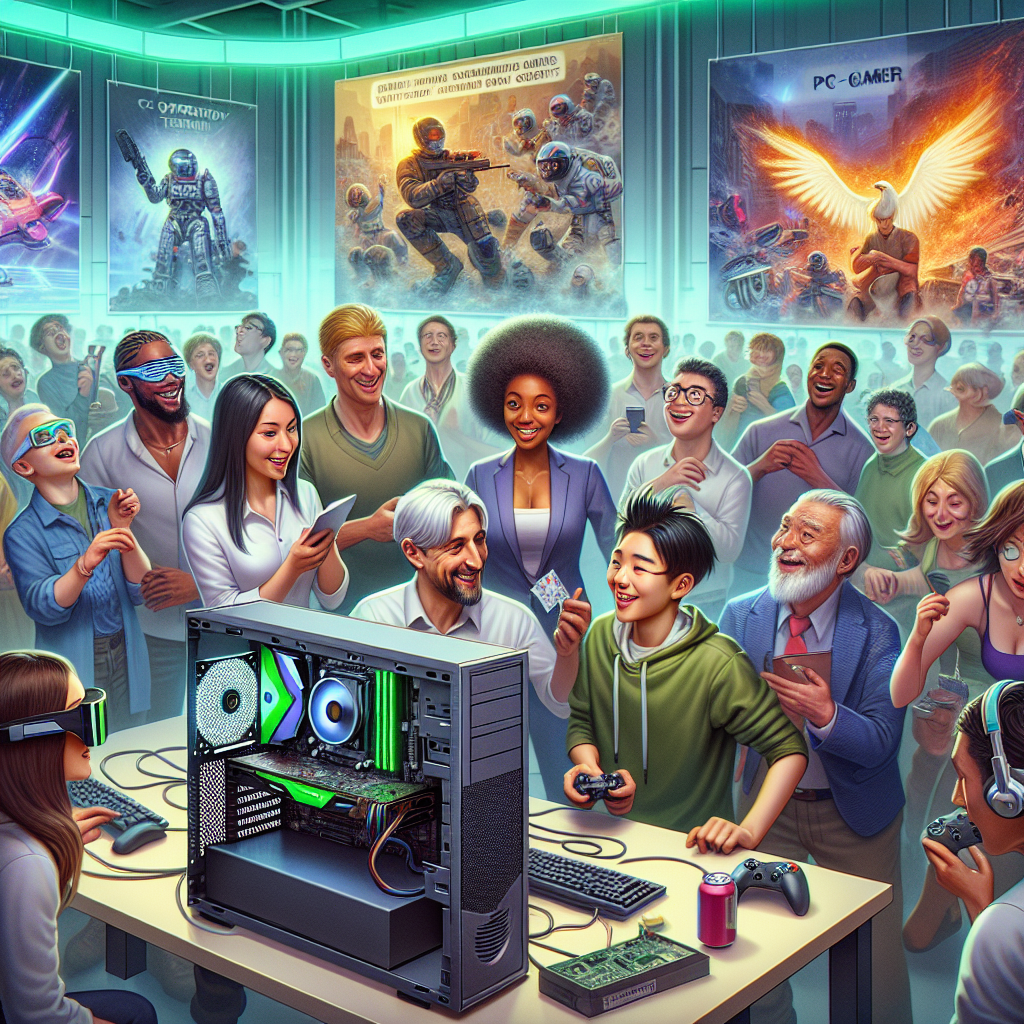The Evolving Landscape of PC Gaming: Enthusiasts, AI Integration, and the Race for Power Efficiency
The world of PC gaming is a constantly evolving spectacle, with each year ushering in new technological breakthroughs that promise to redefine the industry's standards. As we embrace 2024, it's evident that the past year has been a pivotal one, marked by significant developments in hardware capabilities, AI integration, and the relentless pursuit of power efficiency. In this article, we delve into the intricacies of these advancements, examining their impact on both the gaming community and the broader market.
The AI Factor: More Than Just a Marketing Gimmick?
Artificial Intelligence (AI) is no longer a buzzword confined to the realms of futuristic fiction. It's here, and it's transforming the way we interact with technology, including our beloved PCs. AI has begun to embed itself into the fabric of our digital lives, most notably through the integration of neural engines in modern processors. But the question remains: Is the average consumer ready to jump on the AI bandwagon, or is this a case of enthusiasts leading the charge?
As we've seen in 2023, the conversation around AI-powered PCs was largely speculative, with a focus on the potential rather than the practical. However, as developers begin to harness the powers of these neural engines, we could soon witness applications that make the AI features less of a novelty and more of a necessity. The key to widespread adoption lies in demonstrating tangible benefits that resonate with the everyday user, be it through enhanced gaming experiences or productivity boosts.
The Inevitable Quest for Greater Performance
Performance has always been the cornerstone of PC gaming. Enthusiasts crave that extra frame per second, that smoother rendering, and the raw power that pushes their gaming rigs to the forefront of innovation. But as we've learned over the years, brute force isn't always the answer. The industry's shift toward smarter, more efficient architectures has shown that striking a balance between power and performance is the golden ticket to success.
2023 was a testament to this, with discussions around graphics card pricing and performance taking center stage. The unlaunch of certain high-profile GPUs and the dynamic pricing tactics employed by manufacturers highlighted a crucial lesson: there is indeed a threshold for what consumers are willing to pay, and price-to-performance ratios matter more than ever.
The Power Efficiency Paradigm
One cannot discuss performance without addressing the elephant in the room—power efficiency. As chipmakers race to outdo one another, the focus has incrementally shifted from sheer performance gains to how those gains are achieved. The "performance per watt" metric has become increasingly significant, particularly in an era where eco-consciousness is growing and the demand for portable, long-lasting devices is at an all-time high.
In this context, 2023 threw us a curveball with the release of meteor Lake chips. While expectations were sky-high, the reality was a mixed bag, leading to fervent anticipation of firmware updates that could unlock the true potential of these chips. The lesson here is clear: power efficiency is not just a fancy feature to flaunt—it's a necessity that can make or break a product's standing in the competitive landscape.
AMD's Winning Hand with the X3D Lineup
Amidst the power struggles and the AI hype, AMD's X3D lineup emerged as a beacon of stability, delivering a knockout combination of gaming performance and reasonable power draw. The success of the 7800 X3D, in particular, is a nod to enthusiast preferences, pointing to a trend where gamers prioritize performance gains they can see and feel without necessitating a power supply upgrade or a new cooling system.
AMD seems to have struck gold by focusing on delivering high-performance gaming CPUs that don't necessitate a second mortgage. Their strategy of targeting the heart of the gaming market with well-priced, efficient, and powerful chips has positioned them favorably as we move into 2024.
Looking Ahead: What's Next for PC Gaming?
As we peer into the crystal ball of PC gaming's future, several things are apparent. The integration of AI will continue to evolve, potentially leading to groundbreaking applications that could redefine gaming and productivity. Power efficiency will remain a top priority, as both environmental concerns and the push for mobile gaming demand more sophisticated solutions. Lastly, the battle for performance supremacy will rage on, with both AMD and Intel vying for the title of the ultimate gaming CPU.
For enthusiasts and casual gamers alike, the future looks bright—or should we say, efficiently illuminated. 2024 stands ready to build upon the foundations laid in the previous year, promising to deliver a cornucopia of technological marvels that will keep us glued to our screens, immersed in ever-more-engaging virtual realms.
As we look back at the progress made and anticipate the innovations on the horizon, it's clear that the PC gaming industry is not just surviving; it's thriving in a world that's hungry for more. The push for better, faster, and more efficient gaming hardware shows no signs of slowing down. With each passing year, the bar is set higher, and the community rises to the challenge, proving that in the world of PC gaming, the only constant is change—and the undying pursuit of the ultimate gaming experience.
Related News
- Navigating the AI Evolution in Gaming: From Theory to Inevitable Reality
- The Evolving Gaming Hardware Landscape: Insights and Speculations
- The Evolving Landscape of GPU Technology: A Zesty Take on Recent Developments
- Riding the Silicon Roller Coaster: A Whirlwind Recap of Tech in 2023 and Look Ahead to 2024
- The Intriguing State of Silicon: AMD and Intel's Ongoing Dance
